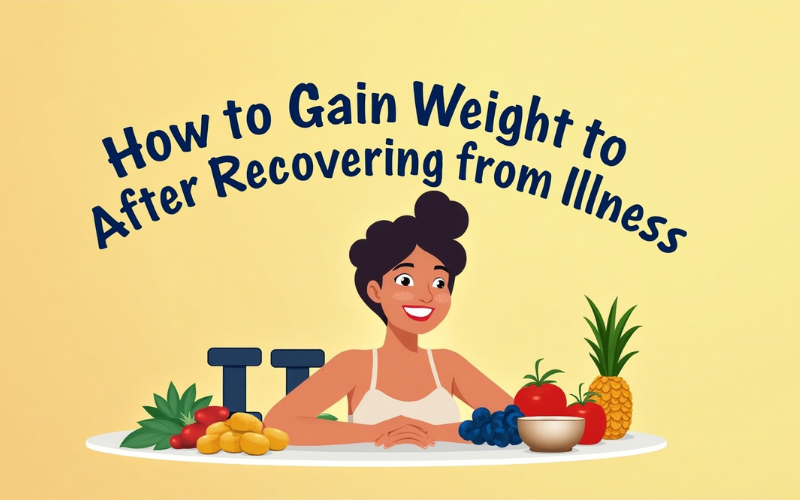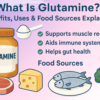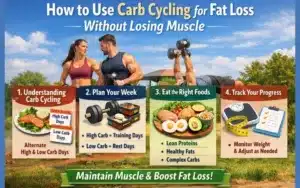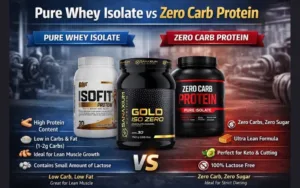No products in the cart.
Return To ShopHow to Gain Weight After Recovering from Illness
Recovering from illness isn’t just about eliminating symptoms it’s also about rebuilding your strength, immunity, and energy. For many people, illness leads to unintended weight loss, especially after infections, surgeries, digestive disorders, or chronic illnesses like cancer or COVID-19. Regaining that lost weight, especially lean muscle mass is vital for full recovery and long-term health.
What Are the Risks of Being Underweight After Illness?
Being underweight following illness can create new health problems, including:
- Weak immune system, making you more prone to infections.
- Delayed wound healing and slower physical recovery.
- Fatigue and low energy due to nutrient depletion.
- Loss of bone and muscle mass, which increases the risk of falls and injuries.
- In severe cases, it can even impact heart and organ function.
Doctors and clinical nutritionists often emphasize that healthy weight gain is just as important as weight loss especially after illness.
How to Know If You’re Underweight Post-Illness
A healthy weight is different for everyone, but key signs you may be underweight include:
- BMI (Body Mass Index) below 18.5
- Noticeable loss of muscle or fat around the face, arms, and legs
- Clothes fitting looser than usual
- Persistent fatigue or low energy
- Lack of appetite even after recovery
If you’re unsure, consult with a doctor or dietitian to assess your nutritional status and body composition.
Healthy Nutrition Strategies for Safe Weight Gain

Weight gain after recovering from illness is not about eating fast food or sugar-heavy snacks. The focus should be on nutrient-dense calories that support your body’s healing and rebuilding processes.
✅ Key principles:
- Eat small, frequent meals: Every 2–3 hours.
- Include protein in every meal: to rebuild muscles.
- Incorporate healthy fats: like olive oil, avocado, and nuts.
- Don’t skip carbs: they’re your energy fuel.
- Drink high-calorie smoothies: between meals.
Best Foods for Weight Gain After Recovery
To make every bite count, choose foods that are high in calories and nutrients:
🥛 Full-Fat Dairy
- Milk, yogurt, paneer, and cheese provide protein, fat, and calcium.
🥑 Healthy Fats
- Avocados, olive oil, ghee, and nut butters are calorie-dense and support hormone balance.
🍗 Protein-Rich Foods
- Chicken, fish, eggs, lentils, tofu, and beans help rebuild lost muscle.
🌾 Whole Grains
- Oats, brown rice, whole wheat roti, millet, and quinoa offer energy and fiber.
🥜 Nuts and Seeds
- Almonds, walnuts, chia seeds, sunflower seeds, and trail mixes are great for snacking.
🥤 Smoothies and Shakes
- Blend milk, banana, peanut butter, oats, and dates for a high-calorie recovery drink.
Sample Meal Plan for Post-Illness Recovery
Here’s a basic meal plan designed for steady, healthy weight gain:
| Time | Meal |
| 8:00 AM | Oatmeal with full-fat milk, chopped almonds, and honey |
| 10:30 AM | Peanut butter on whole grain toast + banana shake |
| 1:00 PM | Chicken or lentil curry + brown rice + avocado slices |
| 4:00 PM | Yogurt with granola, raisins, and walnuts |
| 7:30 PM | Grilled fish or tofu + mashed potatoes + sautéed vegetables in olive oil |
| 9:00 PM | Warm milk with turmeric + 2 dates or a protein bar |
Exercise & Muscle Recovery: Importance of Light Strength Training
Once you start regaining energy, gentle exercise can help:
- Resistance training (using bodyweight, resistance bands, or light weights) builds lean muscle.
- Stretching and walking improve circulation and appetite.
- Don’t overdo it, listen to your body and avoid high-intensity cardio early in recovery.
Working with a physiotherapist or certified trainer is recommended for people recovering from major illnesses or surgery.
When to Consult a Doctor or Dietitian
If you’re struggling to gain weight or have any of the following symptoms, seek medical help:
- Persistent nausea or appetite loss
- Digestive issues like diarrhea or bloating
- Unexplained fatigue
- Underlying conditions like thyroid imbalance or gut inflammation
In some cases, high-calorie medical supplements or nutritional shakes may be prescribed for targeted support.
Conclusion: Patience and Progress Matter
Weight gain after illness is not instant but with a structured plan, balanced meals, and consistent care, your body can return to its healthiest form. Focus on nourishment, not just calories. Recovery is a process to support it with mindful eating and expert guidance when needed.
👉 Need high-quality recovery supplements? Visit SportsOne to explore trusted products for healthy weight gain.
Frequently Asked Questions
Q1: How long does it take to regain weight after illness?
A: Most people regain noticeable weight within 4–8 weeks, depending on metabolism and illness severity. Slow and steady progress is ideal.
Q2: Can I use weight gain supplements after illness?
A: If you struggle with appetite, high-calorie shakes or medical-grade supplements (like Ensure or Protinex) can help. But real food is always better when possible.
Q3: Should I avoid sugar and junk food to gain weight?
A: Yes. These offer empty calories and may delay healing. Choose foods rich in healthy fats, protein, and vitamins.
Q4: Can children or seniors follow the same weight gain plan?
A: Yes, but with age-appropriate portions and medical advice. Children and seniors have different nutrient needs.
Q5: What’s the role of protein in post-illness recovery?
A: Protein repairs tissues and builds lost muscle. Include chicken, fish, eggs, dairy, or lentils in every meal for best results.









Add comment